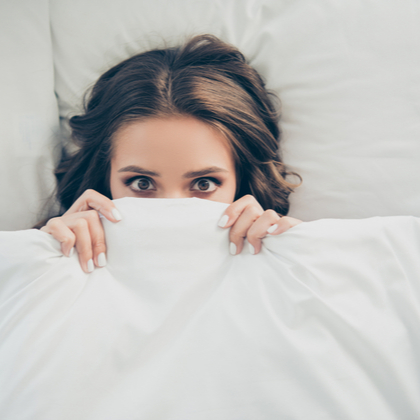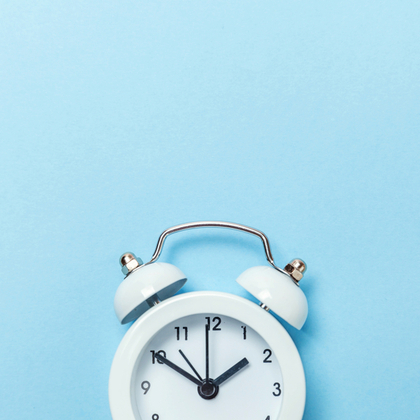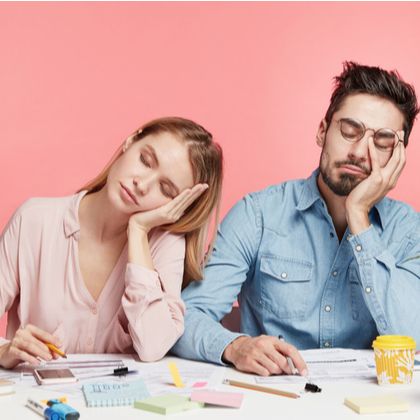
Against the backdrop of global atrocities, social media, the energy crisis, high-pressured jobs, increased cost of living, and climate change, more and more of us are living in a perpetual state of exhaustion, increasingly known as ‘hyper-fatigue’.
In a recent survey, 35% of people admitted they were too tired to make healthy choices in their daily lives to tackle tiredness, perpetuating a vicious cycle of sleeplessness and fatigue (1).
Below, we take a closer look at how to manage hyper-fatigue, improve sleep hygiene, and increase energy levels.
What is fatigue?
It’s normal to feel tired from time to time, but fatigue is when tiredness becomes overwhelming, and you don’t feel better after sleeping and resting. When prolonged and unexplained fatigue starts to affect your everyday life, it’s usually time to seek medical guidance.
What is hyper-fatigue?
Coined by market researchers at Mintel earlier in 2023, ‘hyper-fatigue’ refers to a state of continual mental, emotional, and physical exhaustion. It’s neither the everyday lethargy that comes and goes nor the chronic fatigue associated with illness or hormonal fluctuations. Instead, it’s all-consuming exhaustion caused by unprecedented demands on our energy tanks.
So, if you’re feeling pulled in different directions, you might be experiencing this new wave of extreme fatigue.
Epworth Sleepiness Scale
What is the Epworth Sleepiness Scale?
The Epworth Sleepiness Scale is often used in sleep medicine to determine an individual’s daytime sleepiness (2). You may wish to download the form to fill it out to assess your levels of fatigue.
How likely are you to fall asleep in the following scenarios?
-
No chance of drifting off (0)
-
Slight chance of drifting off (1)
-
Moderate chance of drifting off (2)
-
High chance of drifting off (3)
| Situation | Chance of Dozing |
|---|---|
| Sitting and reading | |
| Watching TV | |
| Sitting inactive in a public place | |
| As a passenger in a car for an hour without a break | |
| Lying down to rest in the afternoon when circumstances allow | |
| Sitting and talking to someone | |
| Sitting quietly after lunch without alcohol | |
| In a car, while stopped for a few minutes in traffic |
Analyse your score
-
0-7: It’s unlikely that you’re sleeping abnormally
-
8-9: You have an average amount of daytime sleepiness
-
10-15: You may be excessively sleeping depending on the situation
-
16-24: You’re excessively sleepy and should consider speaking to a professional
What are the best ways to manage hyper-fatigue?
If your sleep hygiene and energy levels could do with some help, making simple changes to your lifestyle and diet is a great place to start.
Move more
It might sound strange, but sitting around all day can be exhausting. Moving your body, on the other hand, increases circulation and powers up your cells, supercharging your energy levels. Physical activity also releases a bubble bath of feel-good hormones, like dopamine, serotonin, and norepinephrine, which decrease feelings of anxiety and low mood.
Aside from its energy and mood-boosting qualities, exercise improves sleep quality and quantity. Moderate to vigorous activity can reduce sleep onset – the time it takes to fall asleep – and night-time arousals, making it a useful addition for sleep hygiene (3).
If you can, try to move your body outside, especially in the morning. Exposure to morning sunlight helps calibrate your 24-hour internal body clock, or circadian rhythm, helping you sleep better at night.
Many of us have been conditioned into thinking we need to spend hours exercising to enjoy the health benefits. But the truth is micromovements are enough. Even a 15-minute walk can support your energy levels, mood, and sleep hygiene.
Take care with caffeine
For many of us, caffeine is the answer when energy levels are low. And while it provides an initial boost, its effects are short-lived and can leave you feeling more fatigued than before.
Caffeine is also a known disruptor of sleep. It has a half-life of 5 to 7 hours. So, if you have a coffee at 3 pm, you’ll have only metabolised half of its caffeine by 8 pm – the other half will still be in your system, which continues the cycle of sleepiness.
If you can’t go without caffeine, try to enjoy it before noon to avoid its sleep-disrupting qualities. Herbal teas and caffeine-free coffee alternatives are great options if you’re looking to cut back.
Follow a healthy sleep schedule
When you’re faced with the increasing demands of modern life, it’s important to give yourself enough time to switch off to help you transition from day mode to night mode.
To prepare yourself for rest, you may wish to enjoy a hot bath with Epsom salts, journal, meditate, read by a soft lamp, or do some light stretching. Your pre-bed rituals are unique to you; find what relaxes you the most.
Disconnecting from your electronic devices is another important consideration. Aside from emanating blue light – which is known to block melatonin, the sleep hormone – your devices give you ready access to emails and the 24-hour news cycle, commotion-causing activities that aren’t conducive to restful sleep.
Finally, try to stick to the same bedtime and waketime every day, even at weekends. This will help support your internal body clock.
Seek professional help
Alongside lifestyle changes, it might be worth having a chat with a healthcare professional, such as a GP or therapist. They will be able to advise you on the best course of action if you’re experiencing chronic hyper-fatigue and sleep disturbances.
Rethink your nutrition
Eating for sleep requires a multi-faceted approach. What, when, and how much you eat throughout the day can have a cumulative effect on the quality and quantity of your sleep.
Nutritionists advocate eating a balanced, wholefood, minimally processed diet. In theory, this way of eating should provide the vitamins and minerals needed to support sleep and overall health. With plenty of fruit, vegetables, oily fish, nuts, seeds, whole grains, pulses, and extra virgin olive oil, the Mediterranean diet is a great example of these nutritional principles. This traditional way of eating is associated with better sleep, as well as improved heart health (4).
As with caffeine, limiting alcohol is another smart idea, as it can throw your sleep cycle out of whack. Likewise, try not to eat too late. Eating close to bed can lead to digestive issues, like acid reflux, which may keep you up at night.
What nutrients may help hyper-fatigue?
Including more of the following nutrients may also support your sleep and energy levels.
Magnesium
Magnesium contributes to normal muscle and psychological function, as well as a reduction in tiredness and fatigue, making it an excellent addition to your arsenal.
Theanine and lemon balm
The soothing combination of l-theanine and lemon balm is often recommended for sleep.
Valerian root extract
Valerian root is a traditional herbal remedy used for the temporary relief of night-time disturbances and mild anxiety.
Tart cherry juice
Rich in potent antioxidants called anthocyanidins, tart cherry juice is increasingly popular for sleep.
PEA
PEA is an endocannabinoid-like compound found in almost every cell, tissue, and fluid in the body. Naturally produced when cells are damaged or threatened, PEA is a well-researched alternative to CBD. It’s a popular choice to support overall emotional health and sleep.
Vitamin B12
Vitamin B12 plays a critical role in energy production, making it a great addition to help reduce tiredness and fatigue. Read more about vitamins that help minimise the symptoms of fatigue here.
Want to learn more?
If you want to find out more about supporting your sleep hygiene, please explore the rest of our dedicated Sleep Health Hub. Alternatively, get in touch with our team of expert Nutrition Advisors, who are on hand to provide free, confidential advice via email, phone, and Live Chat.
References:
-
People too tired to lead healthier lifestyles, UK survey finds (2023a) The Guardian. Available online: https://www.theguardian.com/society/2023/may/17/people-too-tired-to-lead-healthier-lifestyles-uk-survey-finds
-
About the ESS (no date) Epworth Sleepiness Scale. Available online: https://epworthsleepinessscale.com/about-the-ess/
-
How can exercise affect sleep? (2023) Sleep Foundation. Available online: https://www.sleepfoundation.org/physical-activity/exercise-and-sleep
-
Muscogiuri, G., Barrea, L., Aprano, S., Framondi, L., Di Matteo, R., Laudisio, D., Pugliese, G., Savastano, S., Colao, A., & on behalf of the OPERA PREVENTION Project (2020). Sleep Quality in Obesity: Does Adherence to the Mediterranean Diet Matter?. Nutrients, 12(5), 1364.
Related Posts

Do I Have Symptoms Of Insomnia Or Just Trouble Sleeping?

Insomnia Treatments: Natural Remedies To Help You Fall Asleep

Why Am I Always Tired? Signs Of Poor Sleep Hygiene Explained

Olivia
Olivia Salter has always been an avid health nut. After graduating from the University of Bristol, she began working for a nutritional consultancy where she discovered her passion for all things wellness-related. There, she executed much of the company’s content marketing strategy and found her niche in health writing, publishing articles in Women’s Health, Mind Body Green, Thrive and Psychologies.
View More
